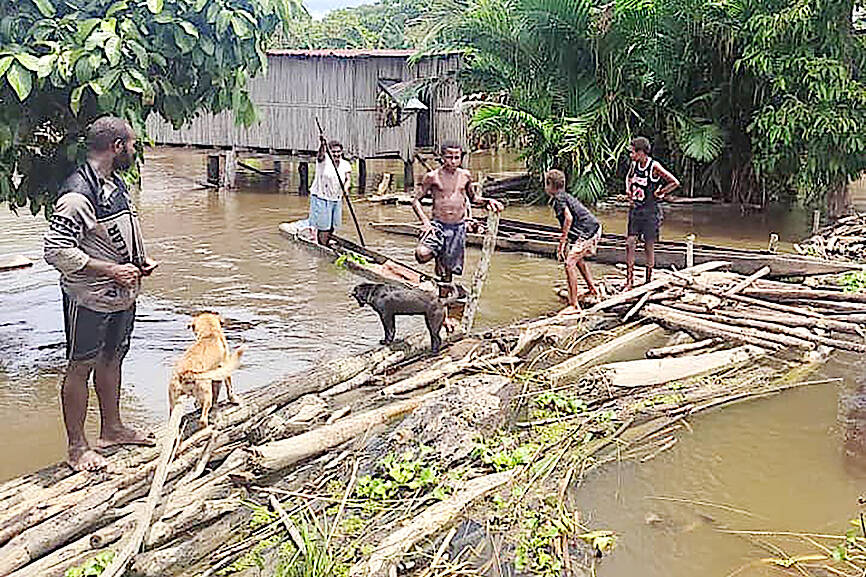At least five people were killed and an estimated 1,000 homes destroyed when a magnitude 6.9 earthquake rocked Papua New Guinea (PNG), officials said yesterday as disaster crews poured into the region.
Dozens of villages nestled on the banks of the nation’s Sepik River were already battling floods when the quake struck early on Sunday morning.
“So far, around 1,000 homes have been lost,” East Sepik Governor Allan Bird said, adding that emergency crews were “still assessing the impact” from a tremor that “damaged most parts of the province.”

Photo: AFP / Papua New Guinea Police
Provincial Police Commander Christopher Tamari said that authorities had so far recorded five deaths in the wake of the disaster.
Tamari said that, with emergency crews still venturing into the remote and jungle-clad region, the number of fatalities “could be more.”
Photographs showed damaged wooden houses with thatched roofs collapsing into the surrounding knee-high floodwaters, while an aging bridge in the provincial capital, Wewak, buckled under the strain.
Bird said that there was a pressing need to get medical supplies, clean drinking water and temporary shelter into the disaster zone.
Papua New Guinean Prime Minister James Marape has approved a US$130 million emergency funding package to help recovery efforts following “a spate of natural disasters” across the nation.
“Papua New Guinea has been recently hit hard by [the] earthquake, flooding caused by heavy rain and ensuing landslips, king tides, strong winds and others,” he said in a statement on Sunday evening following the quake.
Flooding, landslides and torrential rain earlier this month killed at least 23 people.
The Sepik River twists for hundreds of kilometers through Papua New Guinea’s East Sepik Province, flowing down from the jungle highlands and out toward the tropical coast. Largely untouched by urban development and industry, it is one of the nation’s last pristine waterways.

Australia has announced an agreement with the tiny Pacific nation Nauru enabling it to send hundreds of immigrants to the barren island. The deal affects more than 220 immigrants in Australia, including some convicted of serious crimes. Australian Minister of Home Affairs Tony Burke signed the memorandum of understanding on a visit to Nauru, the government said in a statement on Friday. “It contains undertakings for the proper treatment and long-term residence of people who have no legal right to stay in Australia, to be received in Nauru,” it said. “Australia will provide funding to underpin this arrangement and support Nauru’s long-term economic

‘NEO-NAZIS’: A minister described the rally as ‘spreading hate’ and ‘dividing our communities,’ adding that it had been organized and promoted by far-right groups Thousands of Australians joined anti-immigration rallies across the country yesterday that the center-left government condemned, saying they sought to spread hate and were linked to neo-Nazis. “March for Australia” rallies against immigration were held in Sydney, and other state capitals and regional centers, according to the group’s Web site. “Mass migration has torn at the bonds that held our communities together,” the Web site said. The group posted on X on Saturday that the rallies aimed to do “what the mainstream politicians never have the courage to do: demand an end to mass immigration.” The group also said it was concerned about culture,

ANGER: Unrest worsened after a taxi driver was killed by a police vehicle on Thursday, as protesters set alight government buildings across the nation Protests worsened overnight across major cities of Indonesia, far beyond the capital, Jakarta, as demonstrators defied Indonesian President Prabowo Subianto’s call for calm. The most serious unrest was seen in the eastern city of Makassar, while protests also unfolded in Bandung, Surabaya, Solo and Yogyakarta. By yesterday morning, crowds had dispersed in Jakarta. Troops patrolled the streets with tactical vehicles and helped civilians clear trash, although smoke was still rising in various protest sites. Three people died and five were injured in Makassar when protesters set fire to the regional parliament building during a plenary session on Friday evening, according to

STILL AFLOAT: Satellite images show that a Chinese ship damaged in a collision earlier this month was under repair on Hainan, but Beijing has not commented on the incident Australia, Canada and the Philippines on Wednesday deployed three warships and aircraft for drills against simulated aerial threats off a disputed South China Sea shoal where Chinese forces have used risky maneuvers to try to drive away Manila’s aircraft and ships. The Philippine military said the naval drills east of Scarborough Shoal (Huangyan Island, 黃岩島) were concluded safely, and it did not mention any encounter with China’s coast guard, navy or suspected militia ships, which have been closely guarding the uninhabited fishing atoll off northwestern Philippines for years. Chinese officials did not immediately issue any comment on the naval drills, but they